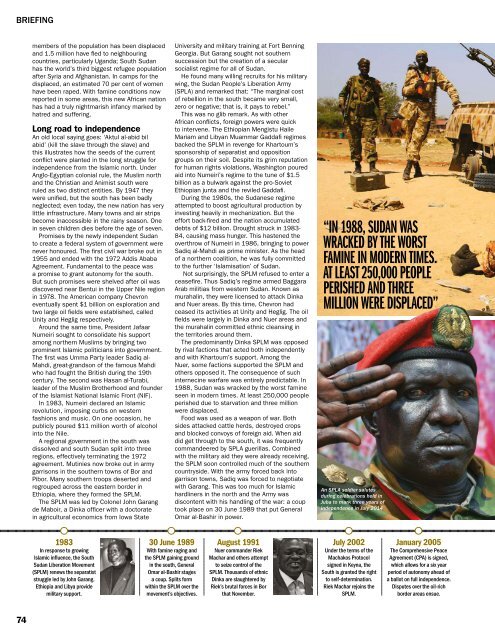You also want an ePaper? Increase the reach of your titles
YUMPU automatically turns print PDFs into web optimized ePapers that Google loves.
BRIEFING<br />
members <strong>of</strong> the population has been displaced<br />
and 1.5 million have fled to neighbouring<br />
countries, particularly Uganda; South Sudan<br />
has the world’s third biggest refugee population<br />
after Syria and Afghanistan. In camps for the<br />
displaced, an estimated 70 per cent <strong>of</strong> women<br />
have been raped. With famine conditions now<br />
reported in some areas, this new African nation<br />
has had a truly nightmarish infancy marked by<br />
hatred and suffering.<br />
Long road to independence<br />
An old local saying goes: ‘Aktul al-abid bil<br />
abid’ (kill the slave through the slave) and<br />
this illustrates how the seeds <strong>of</strong> the current<br />
conflict were planted in the long struggle for<br />
independence from the Islamic north. Under<br />
Anglo-Egyptian colonial rule, the Muslim north<br />
and the Christian and Animist south were<br />
ruled as two distinct entities. By 1947 they<br />
were unified, but the south has been badly<br />
neglected; even today, the new nation has very<br />
little infrastructure. Many towns and air strips<br />
become inaccessible in the rainy season. One<br />
in seven children dies before the age <strong>of</strong> seven.<br />
Promises by the newly independent Sudan<br />
to create a federal system <strong>of</strong> government were<br />
never honoured. The first civil war broke out in<br />
1955 and ended with the 1972 Addis Ababa<br />
Agreement. Fundamental to the peace was<br />
a promise to grant autonomy for the south.<br />
But such promises were shelved after oil was<br />
discovered near Bentui in the Upper Nile region<br />
in 1978. The American company Chevron<br />
eventually spent $1 billion on exploration and<br />
two large oil fields were established, called<br />
Unity and Heglig respectively.<br />
Around the same time, President Jafaar<br />
Numeiri sought to consolidate his support<br />
among northern Muslims by bringing two<br />
prominent Islamic politicians into government.<br />
The first was Umma Party leader Sadiq al-<br />
Mahdi, great-grandson <strong>of</strong> the famous Mahdi<br />
who had fought the British during the 19th<br />
century. The second was Hasan al-Turabi,<br />
leader <strong>of</strong> the Muslim Brotherhood and founder<br />
<strong>of</strong> the Islamist National Islamic Front (NIF).<br />
In 1983, Numeiri declared an Islamic<br />
revolution, imposing curbs on western<br />
fashions and music. On one occasion, he<br />
publicly poured $11 million worth <strong>of</strong> alcohol<br />
into the Nile.<br />
A regional government in the south was<br />
dissolved and south Sudan split into three<br />
regions, effectively terminating the 1972<br />
agreement. Mutinies now broke out in army<br />
garrisons in the southern towns <strong>of</strong> Bor and<br />
Pibor. Many southern troops deserted and<br />
regrouped across the eastern border in<br />
Ethiopia, where they formed the SPLM.<br />
The SPLM was led by Colonel John Garang<br />
de Maboir, a Dinka <strong>of</strong>ficer with a doctorate<br />
in agricultural economics from Iowa State<br />
University and military training at Fort Benning<br />
Georgia. But Garang sought not southern<br />
succession but the creation <strong>of</strong> a secular<br />
socialist regime for all <strong>of</strong> Sudan.<br />
He found many willing recruits for his military<br />
wing, the Sudan People’s Liberation Army<br />
(SPLA) and remarked that: “The marginal cost<br />
<strong>of</strong> rebellion in the south became very small,<br />
zero or negative; that is, it pays to rebel.”<br />
This was no glib remark. As with other<br />
African conflicts, foreign powers were quick<br />
to intervene. The Ethiopian Mengistu Haile<br />
Mariam and Libyan Muammar Gaddafi regimes<br />
backed the SPLM in revenge for Khartoum’s<br />
sponsorship <strong>of</strong> separatist and opposition<br />
groups on their soil. Despite its grim reputation<br />
for human rights violations, Washington poured<br />
aid into Numeiri’s regime to the tune <strong>of</strong> $1.5<br />
billion as a bulwark against the pro-Soviet<br />
Ethiopian junta and the reviled Gaddafi.<br />
During the 1980s, the Sudanese regime<br />
attempted to boost agricultural production by<br />
investing heavily in mechanization. But the<br />
effort back-fired and the nation accumulated<br />
debts <strong>of</strong> $12 billion. Drought struck in 1983-<br />
84, causing mass hunger. This hastened the<br />
overthrow <strong>of</strong> Numeiri in 1986, bringing to power<br />
Sadiq al-Mahdi as prime minister. As the head<br />
<strong>of</strong> a northern coalition, he was fully committed<br />
to the further ‘Islamisation’ <strong>of</strong> Sudan.<br />
Not surprisingly, the SPLM refused to enter a<br />
ceasefire. Thus Sadiq’s regime armed Baggara<br />
Arab militias from western Sudan. Known as<br />
murahalin, they were licensed to attack Dinka<br />
and Nuer areas. By this time, Chevron had<br />
ceased its activities at Unity and Heglig. The oil<br />
fields were largely in Dinka and Nuer areas and<br />
the murahalin committed ethnic cleansing in<br />
the territories around them.<br />
The predominantly Dinka SPLM was opposed<br />
by rival factions that acted both independently<br />
and with Khartoum’s support. Among the<br />
Nuer, some factions supported the SPLM and<br />
others opposed it. The consequence <strong>of</strong> such<br />
internecine warfare was entirely predictable. In<br />
1988, Sudan was wracked by the worst famine<br />
seen in modern times. At least 250,000 people<br />
perished due to starvation and three million<br />
were displaced.<br />
Food was used as a weapon <strong>of</strong> war. Both<br />
sides attacked cattle herds, destroyed crops<br />
and blocked convoys <strong>of</strong> foreign aid. When aid<br />
did get through to the south, it was frequently<br />
commandeered by SPLA guerillas. Combined<br />
with the military aid they were already receiving,<br />
the SPLM soon controlled much <strong>of</strong> the southern<br />
countryside. With the army forced back into<br />
garrison towns, Sadiq was forced to negotiate<br />
with Garang. This was too much for Islamic<br />
hardliners in the north and the Army was<br />
discontent with his handling <strong>of</strong> the war: a coup<br />
took place on 30 June 1989 that put General<br />
Omar al-Bashir in power.<br />
“IN 1988, SUDAN WAS<br />
WRACKED BY THE WORST<br />
FAMINE IN MODERN TIMES.<br />
AT LEAST 250,000 PEOPLE<br />
PERISHED AND THREE<br />
MILLION WERE DISPLACED”<br />
An SPLA soldier salutes<br />
during celebrations held in<br />
Juba to mark three years <strong>of</strong><br />
independence in July 2014<br />
1983<br />
In response to growing<br />
Islamic influence, the South<br />
Sudan Liberation Movement<br />
(SPLM) renews the separatist<br />
struggle led by John Garang.<br />
Ethiopia and Libya provide<br />
military support.<br />
30 June 1989<br />
With famine raging and<br />
the SPLM gaining ground<br />
in the south, General<br />
Omar al-Bashir stages<br />
a coup. Splits form<br />
within the SPLM over the<br />
movement’s objectives.<br />
August 1991<br />
Nuer commander Riek<br />
Machar and others attempt<br />
to seize control <strong>of</strong> the<br />
SPLM. Thousands <strong>of</strong> ethnic<br />
Dinka are slaughtered by<br />
Riek’s brutal forces in Bor<br />
that November.<br />
July 2002<br />
Under the terms <strong>of</strong> the<br />
Machakos Protocol<br />
signed in Keyna, the<br />
South is granted the right<br />
to self-determination.<br />
Riek Machar rejoins the<br />
SPLM.<br />
January 2005<br />
The Comprehensive Peace<br />
Agreement (CPA) is signed,<br />
which allows for a six year<br />
period <strong>of</strong> autonomy ahead <strong>of</strong><br />
a ballot on full independence.<br />
Disputes over the oil-rich<br />
border areas ensue.<br />
74


















